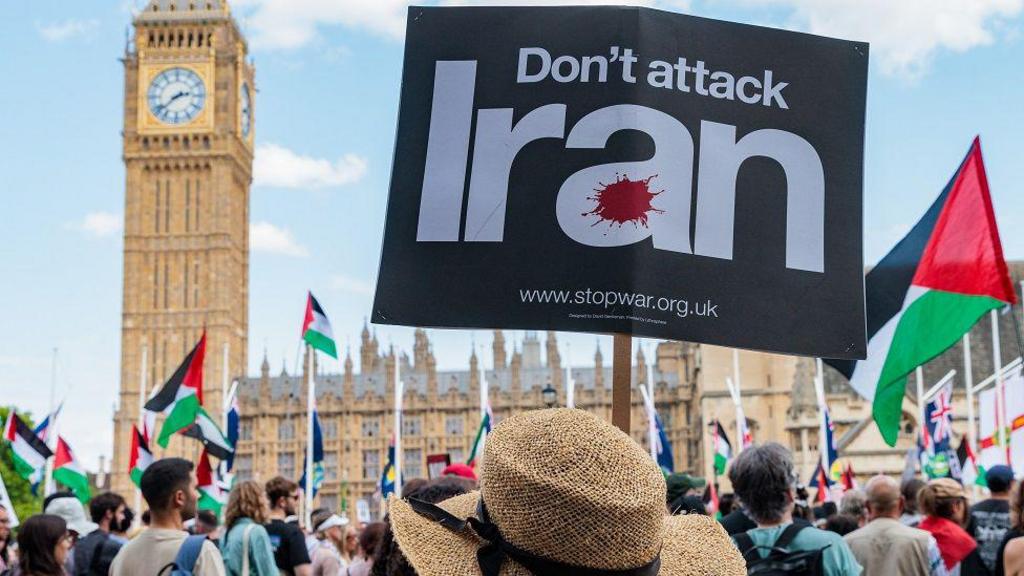Does the current Middle East situation evoke echoes of 2003? Many are asking this question.
In 2003, Britain joined the US in a highly controversial military intervention in Iraq, predicated on the existence of weapons of mass destruction—weapons later proven to have been destroyed years prior.
As America’s closest ally, Britain’s involvement in any potential US military action in the Middle East is almost certain. Should the US commit forces to assist Israel in neutralizing Iran’s nuclear program, what role would the UK play?
Initially, Britain’s position is far from central to the Israel-Iran conflict.
The UK, alongside other G7 nations, has urged de-escalation; however, Israel appears unlikely to heed these calls.
This is partly due to recently strained UK-Israel relations following the UK’s participation in Western sanctions against two Israeli cabinet ministers for alleged incitement of violence against Palestinians.
Furthermore, Israel evidently views this as a strategic window for military action against Iran’s nuclear program, deeming diplomacy obsolete. (Reportedly, Israel did not inform the UK of its attack on Iran, considering it an unreliable partner.)
Nevertheless, the UK, alongside its European allies, maintains a crucial diplomatic role. These allies were instrumental in drafting the 2015 JCPOA Iran nuclear deal, which involved extensive UN inspections in exchange for sanctions relief, until the US withdrawal in 2018.
The UK Foreign Secretary is currently in Washington meeting with his US counterpart and will be in Geneva on Friday to participate in talks with Iran alongside French, German, and EU representatives.
The UK also possesses significant military and strategic assets in the Middle East and Indian Ocean.
Here’s how these could be involved.
The small Indian Ocean island base of Diego Garcia, jointly operated by the UK and US, holds strategic importance disproportionate to its size.
Located 2,300 miles (3,700km) from Iran, it could serve as a staging base for USAF B-2 Spirit bombers, the only aircraft capable of deploying the GBU-57 Massive Ordnance Penetrator (MOP) bomb.
This 30,000lb (13.6 tonne) bomb, described by General Petraeus as a “mountain-buster,” is potentially the only weapon capable of penetrating Iran’s Fordo enrichment facility.
US use of Diego Garcia would require UK approval. The Attorney General reportedly advised the government that any UK military involvement must be purely defensive to remain legal.
The B-2’s range (nearly 7,000 miles) and refueling capabilities mean the US could strike Fordo without Diego Garcia; however, its use is a considerable factor.
The UK maintains two key assets on Cyprus: RAF Akrotiri, currently housing a reinforced contingent of Typhoon jets, and the Ayios Nikolaos signals intelligence station.
The British Army utilizes Cyprus as a base for its rapid deployment force.
RAF Typhoons are currently engaged in Operation Shader, monitoring and occasionally striking IS and al-Qaeda targets. Last year, during a brief Israel-Iran conflict, UK aircraft reportedly assisted in downing Iranian drones. However, in the current conflict, Israel has not requested UK assistance.
The Royal Navy has played a vital role in maintaining the security of the Gulf and Strait of Hormuz, historically through mine-countermeasures operations. However, this presence has diminished recently.
The Ministry of Defence confirms one minesweeper, HMS Middleton, is currently in the Gulf, but adds that vessels are not involved in combat operations.
The UK also maintains a small military presence in Iraq and a port facility in Oman.
Iran has repeatedly warned of retaliation against any nation deemed to have participated in or enabled attacks against it.
US bases and naval vessels would be primary targets. Should the UK authorize USAF use of Diego Garcia, the UK would likely face retaliatory action, potentially including ballistic missile strikes on RAF Akrotiri and domestic security threats.
Iranian Foreign Ministry spokesperson Saeed Khatibzadeh stated that this is “not America’s war”.
The Israeli military claims it targeted the reactor’s core seal to prevent “nuclear weapons development”.
Trump’s press secretary indicated the president believes “substantial chance of negotiations” with Iran exists.
A hospital in Beersheba, Israel, was struck during an Iranian missile barrage.
The BBC’s Lucy Williamson reports from outside Soroka Hospital in Beersheba, where emergency services are assessing the situation.

